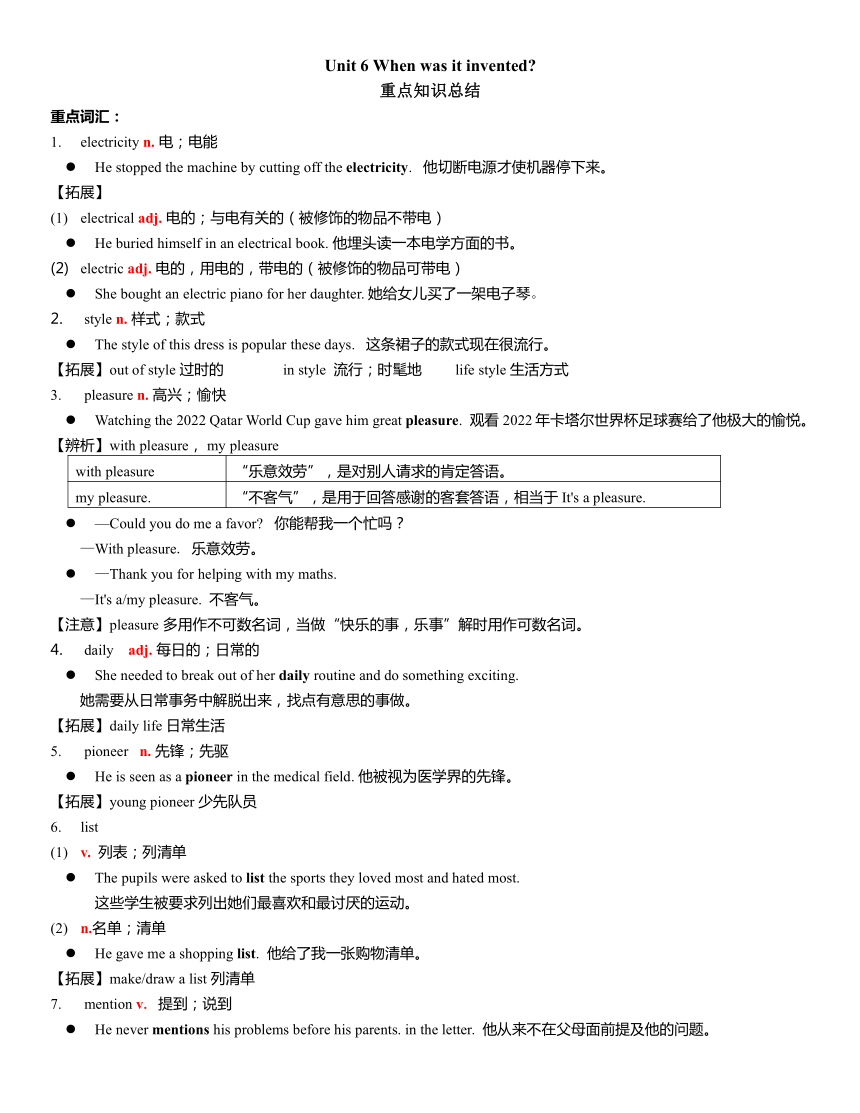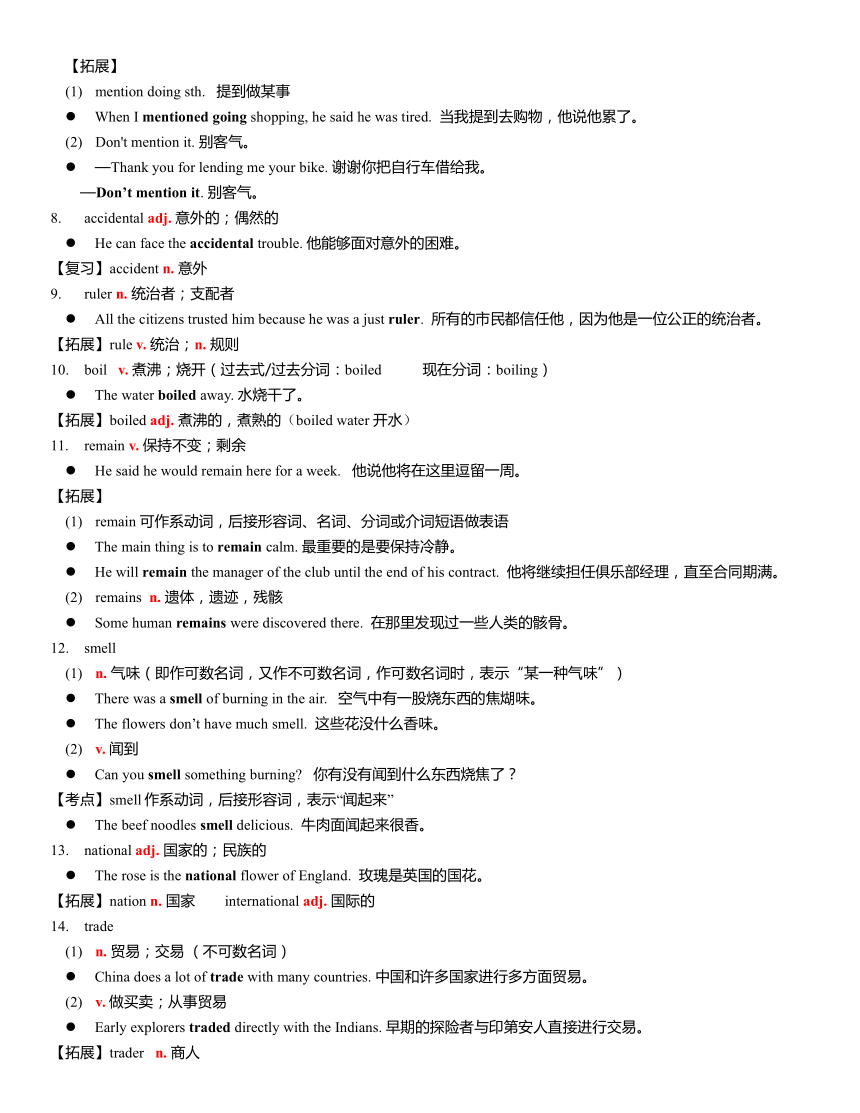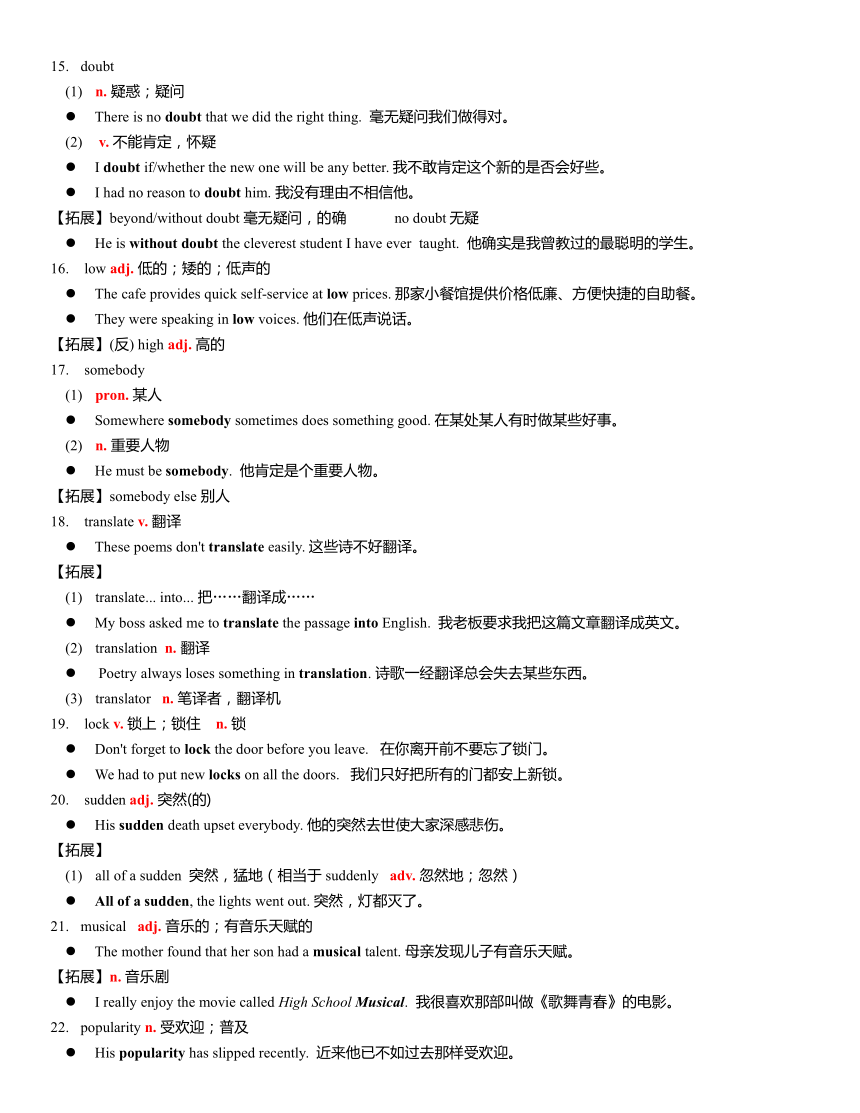Unit 6 When was it invented? 知识点归纳 人教新目标九年级全一册
文档属性
| 名称 | Unit 6 When was it invented? 知识点归纳 人教新目标九年级全一册 |  | |
| 格式 | docx | ||
| 文件大小 | 34.7KB | ||
| 资源类型 | 教案 | ||
| 版本资源 | 人教新目标(Go for it)版 | ||
| 科目 | 英语 | ||
| 更新时间 | 2024-06-25 17:38:43 | ||
图片预览



文档简介
Unit 6 When was it invented
重点知识总结
重点词汇:
electricity n. 电;电能
He stopped the machine by cutting off the electricity. 他切断电源才使机器停下来。
【拓展】
electrical adj. 电的;与电有关的(被修饰的物品不带电)
He buried himself in an electrical book. 他埋头读一本电学方面的书。
electric adj. 电的,用电的,带电的(被修饰的物品可带电)
She bought an electric piano for her daughter. 她给女儿买了一架电子琴。
style n. 样式;款式
The style of this dress is popular these days. 这条裙子的款式现在很流行。
【拓展】out of style 过时的 in style 流行;时髦地 life style 生活方式
pleasure n. 高兴;愉快
Watching the 2022 Qatar World Cup gave him great pleasure. 观看2022年卡塔尔世界杯足球赛给了他极大的愉悦。
【辨析】with pleasure, my pleasure
with pleasure “乐意效劳”,是对别人请求的肯定答语。
my pleasure. “不客气”,是用于回答感谢的客套答语,相当于It's a pleasure.
—Could you do me a favor 你能帮我一个忙吗?
—With pleasure. 乐意效劳。
—Thank you for helping with my maths.
—It's a/my pleasure. 不客气。
【注意】pleasure 多用作不可数名词,当做“快乐的事,乐事”解时用作可数名词。
daily adj. 每日的;日常的
She needed to break out of her daily routine and do something exciting.
她需要从日常事务中解脱出来,找点有意思的事做。
【拓展】daily life 日常生活
pioneer n. 先锋;先驱
He is seen as a pioneer in the medical field. 他被视为医学界的先锋。
【拓展】young pioneer 少先队员
list
v. 列表;列清单
The pupils were asked to list the sports they loved most and hated most.
这些学生被要求列出她们最喜欢和最讨厌的运动。
n.名单;清单
He gave me a shopping list. 他给了我一张购物清单。
【拓展】make/draw a list 列清单
mention v. 提到;说到
He never mentions his problems before his parents. in the letter. 他从来不在父母面前提及他的问题。
【拓展】
mention doing sth. 提到做某事
When I mentioned going shopping, he said he was tired. 当我提到去购物,他说他累了。
Don't mention it. 别客气。
—Thank you for lending me your bike. 谢谢你把自行车借给我。
—Don’t mention it. 别客气。
accidental adj. 意外的;偶然的
He can face the accidental trouble. 他能够面对意外的困难。
【复习】accident n. 意外
ruler n. 统治者;支配者
All the citizens trusted him because he was a just ruler. 所有的市民都信任他,因为他是一位公正的统治者。
【拓展】rule v. 统治;n. 规则
boil v. 煮沸;烧开(过去式/过去分词:boiled 现在分词:boiling)
The water boiled away. 水烧干了。
【拓展】boiled adj. 煮沸的,煮熟的(boiled water 开水)
remain v. 保持不变;剩余
He said he would remain here for a week. 他说他将在这里逗留一周。
【拓展】
remain 可作系动词,后接形容词、名词、分词或介词短语做表语
The main thing is to remain calm. 最重要的是要保持冷静。
He will remain the manager of the club until the end of his contract. 他将继续担任俱乐部经理,直至合同期满。
remains n. 遗体,遗迹,残骸
Some human remains were discovered there. 在那里发现过一些人类的骸骨。
smell
n. 气味(即作可数名词,又作不可数名词,作可数名词时,表示“某一种气味”)
There was a smell of burning in the air. 空气中有一股烧东西的焦煳味。
The flowers don’t have much smell. 这些花没什么香味。
v. 闻到
Can you smell something burning 你有没有闻到什么东西烧焦了?
【考点】smell作系动词,后接形容词,表示“闻起来”
The beef noodles smell delicious. 牛肉面闻起来很香。
national adj. 国家的;民族的
The rose is the national flower of England. 玫瑰是英国的国花。
【拓展】nation n. 国家 international adj. 国际的
trade
n. 贸易;交易 (不可数名词)
China does a lot of trade with many countries. 中国和许多国家进行多方面贸易。
v. 做买卖;从事贸易
Early explorers traded directly with the Indians. 早期的探险者与印第安人直接进行交易。
【拓展】trader n. 商人
doubt
n. 疑惑;疑问
There is no doubt that we did the right thing. 毫无疑问我们做得对。
v. 不能肯定,怀疑
I doubt if/whether the new one will be any better. 我不敢肯定这个新的是否会好些。
I had no reason to doubt him. 我没有理由不相信他。
【拓展】beyond/without doubt 毫无疑问,的确 no doubt无疑
He is without doubt the cleverest student I have ever taught. 他确实是我曾教过的最聪明的学生。
low adj. 低的;矮的;低声的
The cafe provides quick self-service at low prices. 那家小餐馆提供价格低廉、方便快捷的自助餐。
They were speaking in low voices. 他们在低声说话。
【拓展】(反) high adj. 高的
somebody
pron. 某人
Somewhere somebody sometimes does something good. 在某处某人有时做某些好事。
n. 重要人物
He must be somebody. 他肯定是个重要人物。
【拓展】somebody else 别人
translate v. 翻译
These poems don't translate easily. 这些诗不好翻译。
【拓展】
translate... into... 把……翻译成……
My boss asked me to translate the passage into English. 我老板要求我把这篇文章翻译成英文。
translation n. 翻译
Poetry always loses something in translation. 诗歌一经翻译总会失去某些东西。
translator n. 笔译者,翻译机
lock v. 锁上;锁住 n. 锁
Don't forget to lock the door before you leave. 在你离开前不要忘了锁门。
We had to put new locks on all the doors. 我们只好把所有的门都安上新锁。
sudden adj. 突然(的)
His sudden death upset everybody. 他的突然去世使大家深感悲伤。
【拓展】
all of a sudden 突然,猛地(相当于suddenly adv. 忽然地;忽然)
All of a sudden, the lights went out. 突然,灯都灭了。
musical adj. 音乐的;有音乐天赋的
The mother found that her son had a musical talent. 母亲发现儿子有音乐天赋。
【拓展】n. 音乐剧
I really enjoy the movie called High School Musical. 我很喜欢那部叫做《歌舞青春》的电影。
popularity n. 受欢迎;普及
His popularity has slipped recently. 近来他已不如过去那样受欢迎。
【拓展】popular adj. 流行的,受欢迎的
customer n. 顾客;客户
We should provide our customers with good service. 我们应该为顾客提供好的服务。
【拓展】custom n. 风俗习惯
It's a local custom. 这是当地的风俗习惯。
Canadian adj. 加拿大的;加拿大人的 n. 加拿大人
Her sister is a Canadian teacher. 她的姐姐是一位加拿大教师。
【拓展】Canada n. 加拿大
salty adj. 咸的
I think the soup is salty enough. 我认为汤够咸了。
【归纳】名词+-y构成的形容词:
rain rainy(多雨的,下雨的) luck lucky(幸运的)
snow snowy(多雪的,下雪的) health healthy(健康的)
wind windy(多风的,有风的) sleep sleepy(困倦的,瞌睡的)
cloud cloudy(多云的,阴天) storm stormy(有暴风雨的)
divide v. 分开;分散
The cake was divided equally among her four children. 这个蛋糕在她的四个孩子中平分了。
【拓展】 divide... into... 把……分成
Let's divide ourselves into several groups. 让我们分成几个小组吧。
hero n. 英雄;男主角 (复数形式:heroes)
The hero of the film is Jackie Chan. 这部影片的男主角是成龙。
【拓展】heroine n. 女英雄,女主角
professional adj. 职业的;专业的
He wants to be a professional basketball player. 他想成为一名职业篮球运动员。
【拓展】profession n. 职业
常考短语
have a point 有道理
You have a point—it’s better for me to do more exercise. 你说的有道理,对于我来说,多锻炼更好。
by accident=by chance 偶然;意外地
We met by accident at the airport. 我们在机场不期而遇。
fall into 落入;陷入……
He fell into the river suddenly. 他突然掉进了河里。
【拓展】fall over 绊倒,跌倒 fall down从……摔下/掉下
I saw the little girl fall over and hit her head. 我看到这小女孩绊倒了,碰了头。
Why did it fall down 它为什么掉了下来?
take place 发生;出现
The next meeting will take place on Thursday. 下次会议将在星期四举行。
【辨析】take place, happen
take place 表示必然性的“发生”或指根据计划或安排“举行”的,无被动语态
happen 表示偶然性的,没有预料到的“发生”,无被动语态
It has been confirmed that the meeting will take place next week. 已经确定会议将于下个星期召开。
All these changes happened over a period of time. 所有这些变化都是在一段时间内发生的。
less than 少于;不到
He sleeps less than seven hours every night. 他每晚的睡眠时间不到7个小时。
not… until... 直到……才……
She can't leave until Friday. 直到星期五她才能离开。
It is said that… 据说……;有人说……(其中it 为形式主语, that 引导的从句作真正的主语)。
It is said that wisdom is born with a man. 有人说智慧是与生俱来的。
【拓展】类似的句型还有:
It is believed that… 人们认为……
It is reported that… 据报道……
It is known/well-known that… 众所周知……
It is supposed that… 据猜测……
by mistake 错误地;无意中
I took your pen by mistake. 我错拿了你的钢笔。
in the end 最后
They were out of danger in the end. 他们最后脱险了。
【拓展】end相关短语:
at the end of+时间/地点 在……的尽头
The hospital closed at the end of last year. 这所医院去年年底关闭。
Turn right at the end of the road. 在路的尽头向右转。
by the end of+时间
By the end of the day we were tired but happy. 一天结束时,我们很累,但很高兴。
at the same time 同时
It's impossible to get everybody together at the same time. 让所有人同时聚在一起是不可能的。
stop sb. from doing sth. 阻止某人做某事
No one can stop him from smoking. 没人能阻止他吸烟。
dream of/about 梦想;向往
The boy dreams of/about becoming a scientist. 那个男孩梦想成为一名科学家。
the number of... ……的数量
The number of the students in our class is 45. 我们班学生的数量是45人。
【辨析】a number of 大量的
A number of guests were invited to the party last year.
look up to 钦佩;仰慕
They look up to him for his knowledge. 他们因为他的学识而钦佩他。
not only...but also... 不仅……而且……(also可省略)
To achieve a bright future, we should not only study hard but also keep in good health.
为了获得一个光明的未来,我们不但应该努力学习,而且要保持身体健康。
【注意】
not only...but also...连接两个并列主语时,谓语动词在人称和数上要与but also后的主语保持一致(就近原则)
Not only she but also I am interested in the novel. 不仅她而且我也对这部小说感兴趣。
倒装:not only...but also...连接两个并列分句时,not only置于句首,表示强调,其引导的句子要用部分倒装,即将谓语动词的一部分(如情态动词、助动词等)放到主语之前,而but also后的句子保持正常的语序。
Not only do I feel good about helping people, but also I get to spend time doing what I love to do.
我不仅感到帮助人很好,而且我开始把时间用在我喜欢做的事情上。
encourage sb. to do sth. 鼓励某人做某事
Children should be encouraged to try something new. 应该鼓励孩子尝试新事物。
achieve one’s dream 实现某人的梦想
I am sure he will achieve his dream in the end.我确信他最终会实现他的梦想。
【拓展】
achievement n. 成就
It was a remarkable achievement for such a young player. 如此年轻的选手有这样的成绩真是了不起。
同义短语:realize one’s dream; make one’s dream come true
单元语法:一般过去时的被动语态
一般过去时的被动语态:
一般过去时的被动语态的构成:was/were+及物动词的过去分词。
The chair was made by my grandfather. 这把椅子是由我祖父做的。
They were invented by Thomas Alva Edison. 它们是由托马斯·阿尔瓦·爱迪生发明的。
句式结构:
肯定句 主语+was/were+及物动词的过去分词+其他.
否定句 主语+wasn't/weren't+及物动词的过去分词+其他.
疑问句 Was/Were+主语+及物动词的过去分词+其他 肯定回答: Yes, 主语+was/were.
否定回答: No, 主语+wasn't/weren't.
特殊疑问词+was/were+主语+及物动词的过去分词+其他
一般过去时的被动语态的基本用法:
表示过去某一具体时间发生的动作,且句子的主语是谓语动词动作的的承受者。
The book was written by Jin Yong more than ten years ago.
讲述发生在过去的动作,且不知道动作的执行者。
The building was named after a famous scientist. 这座建筑是以一位著名科学家的名字命名的。
被动语态的注意事项:
在主动语态中,在 make, hear, see, watch, notice 等词后跟省略to的动词不定式,但在被动语态中, to不可省略。
We saw a stranger enter the hall.→A stranger was seen to enter the hall by us. 我们看到一个陌生人进入了大厅。
重点知识总结
重点词汇:
electricity n. 电;电能
He stopped the machine by cutting off the electricity. 他切断电源才使机器停下来。
【拓展】
electrical adj. 电的;与电有关的(被修饰的物品不带电)
He buried himself in an electrical book. 他埋头读一本电学方面的书。
electric adj. 电的,用电的,带电的(被修饰的物品可带电)
She bought an electric piano for her daughter. 她给女儿买了一架电子琴。
style n. 样式;款式
The style of this dress is popular these days. 这条裙子的款式现在很流行。
【拓展】out of style 过时的 in style 流行;时髦地 life style 生活方式
pleasure n. 高兴;愉快
Watching the 2022 Qatar World Cup gave him great pleasure. 观看2022年卡塔尔世界杯足球赛给了他极大的愉悦。
【辨析】with pleasure, my pleasure
with pleasure “乐意效劳”,是对别人请求的肯定答语。
my pleasure. “不客气”,是用于回答感谢的客套答语,相当于It's a pleasure.
—Could you do me a favor 你能帮我一个忙吗?
—With pleasure. 乐意效劳。
—Thank you for helping with my maths.
—It's a/my pleasure. 不客气。
【注意】pleasure 多用作不可数名词,当做“快乐的事,乐事”解时用作可数名词。
daily adj. 每日的;日常的
She needed to break out of her daily routine and do something exciting.
她需要从日常事务中解脱出来,找点有意思的事做。
【拓展】daily life 日常生活
pioneer n. 先锋;先驱
He is seen as a pioneer in the medical field. 他被视为医学界的先锋。
【拓展】young pioneer 少先队员
list
v. 列表;列清单
The pupils were asked to list the sports they loved most and hated most.
这些学生被要求列出她们最喜欢和最讨厌的运动。
n.名单;清单
He gave me a shopping list. 他给了我一张购物清单。
【拓展】make/draw a list 列清单
mention v. 提到;说到
He never mentions his problems before his parents. in the letter. 他从来不在父母面前提及他的问题。
【拓展】
mention doing sth. 提到做某事
When I mentioned going shopping, he said he was tired. 当我提到去购物,他说他累了。
Don't mention it. 别客气。
—Thank you for lending me your bike. 谢谢你把自行车借给我。
—Don’t mention it. 别客气。
accidental adj. 意外的;偶然的
He can face the accidental trouble. 他能够面对意外的困难。
【复习】accident n. 意外
ruler n. 统治者;支配者
All the citizens trusted him because he was a just ruler. 所有的市民都信任他,因为他是一位公正的统治者。
【拓展】rule v. 统治;n. 规则
boil v. 煮沸;烧开(过去式/过去分词:boiled 现在分词:boiling)
The water boiled away. 水烧干了。
【拓展】boiled adj. 煮沸的,煮熟的(boiled water 开水)
remain v. 保持不变;剩余
He said he would remain here for a week. 他说他将在这里逗留一周。
【拓展】
remain 可作系动词,后接形容词、名词、分词或介词短语做表语
The main thing is to remain calm. 最重要的是要保持冷静。
He will remain the manager of the club until the end of his contract. 他将继续担任俱乐部经理,直至合同期满。
remains n. 遗体,遗迹,残骸
Some human remains were discovered there. 在那里发现过一些人类的骸骨。
smell
n. 气味(即作可数名词,又作不可数名词,作可数名词时,表示“某一种气味”)
There was a smell of burning in the air. 空气中有一股烧东西的焦煳味。
The flowers don’t have much smell. 这些花没什么香味。
v. 闻到
Can you smell something burning 你有没有闻到什么东西烧焦了?
【考点】smell作系动词,后接形容词,表示“闻起来”
The beef noodles smell delicious. 牛肉面闻起来很香。
national adj. 国家的;民族的
The rose is the national flower of England. 玫瑰是英国的国花。
【拓展】nation n. 国家 international adj. 国际的
trade
n. 贸易;交易 (不可数名词)
China does a lot of trade with many countries. 中国和许多国家进行多方面贸易。
v. 做买卖;从事贸易
Early explorers traded directly with the Indians. 早期的探险者与印第安人直接进行交易。
【拓展】trader n. 商人
doubt
n. 疑惑;疑问
There is no doubt that we did the right thing. 毫无疑问我们做得对。
v. 不能肯定,怀疑
I doubt if/whether the new one will be any better. 我不敢肯定这个新的是否会好些。
I had no reason to doubt him. 我没有理由不相信他。
【拓展】beyond/without doubt 毫无疑问,的确 no doubt无疑
He is without doubt the cleverest student I have ever taught. 他确实是我曾教过的最聪明的学生。
low adj. 低的;矮的;低声的
The cafe provides quick self-service at low prices. 那家小餐馆提供价格低廉、方便快捷的自助餐。
They were speaking in low voices. 他们在低声说话。
【拓展】(反) high adj. 高的
somebody
pron. 某人
Somewhere somebody sometimes does something good. 在某处某人有时做某些好事。
n. 重要人物
He must be somebody. 他肯定是个重要人物。
【拓展】somebody else 别人
translate v. 翻译
These poems don't translate easily. 这些诗不好翻译。
【拓展】
translate... into... 把……翻译成……
My boss asked me to translate the passage into English. 我老板要求我把这篇文章翻译成英文。
translation n. 翻译
Poetry always loses something in translation. 诗歌一经翻译总会失去某些东西。
translator n. 笔译者,翻译机
lock v. 锁上;锁住 n. 锁
Don't forget to lock the door before you leave. 在你离开前不要忘了锁门。
We had to put new locks on all the doors. 我们只好把所有的门都安上新锁。
sudden adj. 突然(的)
His sudden death upset everybody. 他的突然去世使大家深感悲伤。
【拓展】
all of a sudden 突然,猛地(相当于suddenly adv. 忽然地;忽然)
All of a sudden, the lights went out. 突然,灯都灭了。
musical adj. 音乐的;有音乐天赋的
The mother found that her son had a musical talent. 母亲发现儿子有音乐天赋。
【拓展】n. 音乐剧
I really enjoy the movie called High School Musical. 我很喜欢那部叫做《歌舞青春》的电影。
popularity n. 受欢迎;普及
His popularity has slipped recently. 近来他已不如过去那样受欢迎。
【拓展】popular adj. 流行的,受欢迎的
customer n. 顾客;客户
We should provide our customers with good service. 我们应该为顾客提供好的服务。
【拓展】custom n. 风俗习惯
It's a local custom. 这是当地的风俗习惯。
Canadian adj. 加拿大的;加拿大人的 n. 加拿大人
Her sister is a Canadian teacher. 她的姐姐是一位加拿大教师。
【拓展】Canada n. 加拿大
salty adj. 咸的
I think the soup is salty enough. 我认为汤够咸了。
【归纳】名词+-y构成的形容词:
rain rainy(多雨的,下雨的) luck lucky(幸运的)
snow snowy(多雪的,下雪的) health healthy(健康的)
wind windy(多风的,有风的) sleep sleepy(困倦的,瞌睡的)
cloud cloudy(多云的,阴天) storm stormy(有暴风雨的)
divide v. 分开;分散
The cake was divided equally among her four children. 这个蛋糕在她的四个孩子中平分了。
【拓展】 divide... into... 把……分成
Let's divide ourselves into several groups. 让我们分成几个小组吧。
hero n. 英雄;男主角 (复数形式:heroes)
The hero of the film is Jackie Chan. 这部影片的男主角是成龙。
【拓展】heroine n. 女英雄,女主角
professional adj. 职业的;专业的
He wants to be a professional basketball player. 他想成为一名职业篮球运动员。
【拓展】profession n. 职业
常考短语
have a point 有道理
You have a point—it’s better for me to do more exercise. 你说的有道理,对于我来说,多锻炼更好。
by accident=by chance 偶然;意外地
We met by accident at the airport. 我们在机场不期而遇。
fall into 落入;陷入……
He fell into the river suddenly. 他突然掉进了河里。
【拓展】fall over 绊倒,跌倒 fall down从……摔下/掉下
I saw the little girl fall over and hit her head. 我看到这小女孩绊倒了,碰了头。
Why did it fall down 它为什么掉了下来?
take place 发生;出现
The next meeting will take place on Thursday. 下次会议将在星期四举行。
【辨析】take place, happen
take place 表示必然性的“发生”或指根据计划或安排“举行”的,无被动语态
happen 表示偶然性的,没有预料到的“发生”,无被动语态
It has been confirmed that the meeting will take place next week. 已经确定会议将于下个星期召开。
All these changes happened over a period of time. 所有这些变化都是在一段时间内发生的。
less than 少于;不到
He sleeps less than seven hours every night. 他每晚的睡眠时间不到7个小时。
not… until... 直到……才……
She can't leave until Friday. 直到星期五她才能离开。
It is said that… 据说……;有人说……(其中it 为形式主语, that 引导的从句作真正的主语)。
It is said that wisdom is born with a man. 有人说智慧是与生俱来的。
【拓展】类似的句型还有:
It is believed that… 人们认为……
It is reported that… 据报道……
It is known/well-known that… 众所周知……
It is supposed that… 据猜测……
by mistake 错误地;无意中
I took your pen by mistake. 我错拿了你的钢笔。
in the end 最后
They were out of danger in the end. 他们最后脱险了。
【拓展】end相关短语:
at the end of+时间/地点 在……的尽头
The hospital closed at the end of last year. 这所医院去年年底关闭。
Turn right at the end of the road. 在路的尽头向右转。
by the end of+时间
By the end of the day we were tired but happy. 一天结束时,我们很累,但很高兴。
at the same time 同时
It's impossible to get everybody together at the same time. 让所有人同时聚在一起是不可能的。
stop sb. from doing sth. 阻止某人做某事
No one can stop him from smoking. 没人能阻止他吸烟。
dream of/about 梦想;向往
The boy dreams of/about becoming a scientist. 那个男孩梦想成为一名科学家。
the number of... ……的数量
The number of the students in our class is 45. 我们班学生的数量是45人。
【辨析】a number of 大量的
A number of guests were invited to the party last year.
look up to 钦佩;仰慕
They look up to him for his knowledge. 他们因为他的学识而钦佩他。
not only...but also... 不仅……而且……(also可省略)
To achieve a bright future, we should not only study hard but also keep in good health.
为了获得一个光明的未来,我们不但应该努力学习,而且要保持身体健康。
【注意】
not only...but also...连接两个并列主语时,谓语动词在人称和数上要与but also后的主语保持一致(就近原则)
Not only she but also I am interested in the novel. 不仅她而且我也对这部小说感兴趣。
倒装:not only...but also...连接两个并列分句时,not only置于句首,表示强调,其引导的句子要用部分倒装,即将谓语动词的一部分(如情态动词、助动词等)放到主语之前,而but also后的句子保持正常的语序。
Not only do I feel good about helping people, but also I get to spend time doing what I love to do.
我不仅感到帮助人很好,而且我开始把时间用在我喜欢做的事情上。
encourage sb. to do sth. 鼓励某人做某事
Children should be encouraged to try something new. 应该鼓励孩子尝试新事物。
achieve one’s dream 实现某人的梦想
I am sure he will achieve his dream in the end.我确信他最终会实现他的梦想。
【拓展】
achievement n. 成就
It was a remarkable achievement for such a young player. 如此年轻的选手有这样的成绩真是了不起。
同义短语:realize one’s dream; make one’s dream come true
单元语法:一般过去时的被动语态
一般过去时的被动语态:
一般过去时的被动语态的构成:was/were+及物动词的过去分词。
The chair was made by my grandfather. 这把椅子是由我祖父做的。
They were invented by Thomas Alva Edison. 它们是由托马斯·阿尔瓦·爱迪生发明的。
句式结构:
肯定句 主语+was/were+及物动词的过去分词+其他.
否定句 主语+wasn't/weren't+及物动词的过去分词+其他.
疑问句 Was/Were+主语+及物动词的过去分词+其他 肯定回答: Yes, 主语+was/were.
否定回答: No, 主语+wasn't/weren't.
特殊疑问词+was/were+主语+及物动词的过去分词+其他
一般过去时的被动语态的基本用法:
表示过去某一具体时间发生的动作,且句子的主语是谓语动词动作的的承受者。
The book was written by Jin Yong more than ten years ago.
讲述发生在过去的动作,且不知道动作的执行者。
The building was named after a famous scientist. 这座建筑是以一位著名科学家的名字命名的。
被动语态的注意事项:
在主动语态中,在 make, hear, see, watch, notice 等词后跟省略to的动词不定式,但在被动语态中, to不可省略。
We saw a stranger enter the hall.→A stranger was seen to enter the hall by us. 我们看到一个陌生人进入了大厅。
同课章节目录
- Unit 1 How can we become good learners.
- Section A
- Section B
- Unit 2 I think that mooncakes are delicious!
- Section A
- Section B
- Unit 3 Could you please tell me where the restroom
- Section A
- Section B
- Unit 4 I used to be afraid of the dark.
- Section A
- Section B
- Unit 5 What are the shirts made of?
- Section A
- Section B
- Review of Units 1-5
- Unit 6 When was it invented?
- Section A
- Section B
- Unit 7 Teenagers should be allowed to choose their
- Section A
- Section B
- Unit 8 It must belong to Carla.
- Section A
- Section B
- Unit 9 I like music that I can dance to.
- Section A
- Section B
- Unit 10 You're supposed to shake hands.
- Section A
- Section B
- Review of Units 6-10
- Unit 11 Sad movies make me cry.
- Section A
- Section B
- Unit 12 Life is full of the unexpected
- Section A
- Section B
- Unit 13 We're trying to save the earth!
- Section A
- Section B
- Unit 14 I remember meeting all of you in Grade 7.
- Section A
- Section B
- Review of Units 11-14
